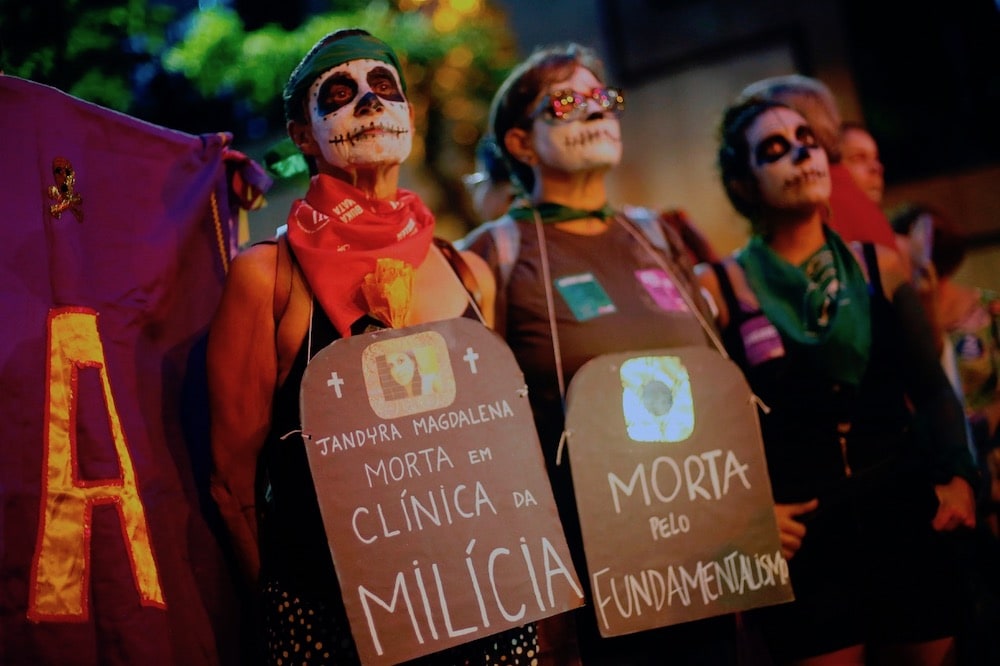CPJ urges the state assembly in the southern Brazilian state of Santa Catarina to drop its investigation into independent investigative outlet "The Intercept Brasil" and independent online outlet "Portal Catarinas" and respect the confidentiality of journalistic sources.
This statement was originally published on cpj.org on 24 October 2022.
The state assembly in the southern Brazilian state of Santa Catarina must immediately drop its investigation into independent investigative outlet The Intercept Brasil and independent online outlet Portal Catarinas and respect the confidentiality of journalistic sources, the Committee to Protect Journalists said Monday.On October 11, Santa Catarina’s state assembly held the first session of a Parliamentarian Commission of Investigation (CPI), which is investigating The Intercept Brasil and Portal Catarinas for their joint report, published on June 20, about attempts by members of the state’s legal system to impede an 11-year-old rape survivor’s access to a legal abortion, according to multiple news reports, the Santa Catarina State Assembly website, and the assembly members’ request for an investigation.On June 28, Santa Catarina state assembly member Ana Campagnolo filed a petition, co-signed by 21 members of the assembly, asking the CPI to determine how the two outlets gained access to leaked information cited in the article, including a video of the hearing in which a prosecutor and the judge question the then 10-year-old and repeatedly try to convince her not to end the pregnancy.“The Santa Catarina assembly’s investigation of The Intercept Brasil and Portal Catarinas is blatantly targeting outlets and journalists that courageously exposed the state’s mistreatment of a minor rape survivor seeking to access legal abortion care. This is an attempt to intimidate the press and threaten their sources,” said Natalie Southwick, CPJ’s Latin America and the Caribbean program coordinator, in New York. “The Santa Catarina state assembly should immediately drop this absurd investigation and respect press freedom and source confidentiality – rights guaranteed in the Brazilian constitution.”
Campagnolo’s petition said the investigation would look into the leaking of the video to the press and aimed to “clarify” how the journalists were able to obtain access to “relevant, confidential, and extremely serious information.”
According to Article 41 of the Santa Catarina state assembly internal regiment, a CPI has “investigative powers similar to the judicial authorities,” including the ability to subpoena, and will have 120 days to conclude the investigation, which can be extended for another 60 days upon request.
Article 5 of Brazil’s federal constitution protects the “confidentiality of the source when necessary for the professional exercise.”
“This investigation is clearly an attempt by politicians to criminalize, intimidate and silence the journalism that revealed the Santa Catarina state justice system’s shocking abuses against an innocent 11-year-old girl,” Andrew Fishman, president of The Intercept Brasil, told CPJ via messaging app. “The Intercept and Portal Catarinas have provided a public service with their reporting and did not commit any crimes.”
The June 20 article by Portal Catarinas and The Intercept Brasil revealed that the child was denied access to legal abortion care when her mother took her to a hospital in Santa Catarina. Then, a state court ordered her to be taken away from her family and kept in a shelter for more than a month.
Article 124 of the Brazilian penal code punishes abortion, except in cases of rape or when there is no other way to save the pregnant person’s life.
In response to the reporting, President Jair Bolsonaro and the Ministry of Women, Family and Human Rights openly called for an investigation into the outlets, according to news reports. On July 19, the Santa Catarina state assembly authorized the opening of the investigation, according to news reports and the assembly’s website.
On October 5, CPJ and 15 other press freedom and women’s rights groups sent a letter to the Special Rapporteur on Freedom of Expression of the Inter-American Commission of Human Rights expressing concern about the risks the parliamentarian investigation poses to press freedom and source confidentiality.
CPJ emailed Ana Campagnolo and phoned her cabinet at the state assembly but did not receive an immediate response. CPJ also emailed the Ministry of Women, Family, and Human Rights but did not receive a response.
As CPJ has previously documented, outlets reporting on women’s rights and abortion in Brazil have faced criminal complaints, DDoS attacks, and judicial harassment.



